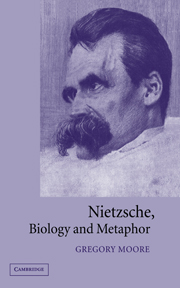4 - Nietzsche and the nervous age
Published online by Cambridge University Press: 22 September 2009
Summary
When Nietzsche writes in The Case of Wagner that perhaps ‘nothing is better known today, at least nothing has been better studied, than the Protean character of degenerescence’ (CW5), he captures succinctly not only the concerns and fears of his age, but also the very nature of degenerationor degeneration, or dégénérescence (to give it its original French name), is indeed a fluid concept. It was, as Daniel Pick has argued, ‘the ultimate signifier of pathology’, serving ‘to anchor meaning, but paradoxically its own could never be fully stabilised’. Although the medico-psychiatric and natural-scientific language of degeneration resonates throughout much of the writing of the second half of the nineteenth century, the disease entity itself was, like hysteria and neurasthenia – disorders which were later subsumed under the broader category of degeneration – never coherently and consistently defined. ‘Degeneration’ remained an imprecise, elusive term, without a clear referent, and inherently metaphorical. It is for this very reason, as we shall see in the next few chapters, that this discourse provides an ideal vehicle for Nietzsche's ‘medicynical’ polemics (EH III, 5).
The concept of degeneration had been circulating for a number of decades in the biological sciences, with Buffon having first employed it to describe the reversion of domesticated species to their original type.
- Type
- Chapter
- Information
- Nietzsche, Biology and Metaphor , pp. 115 - 138Publisher: Cambridge University PressPrint publication year: 2002



